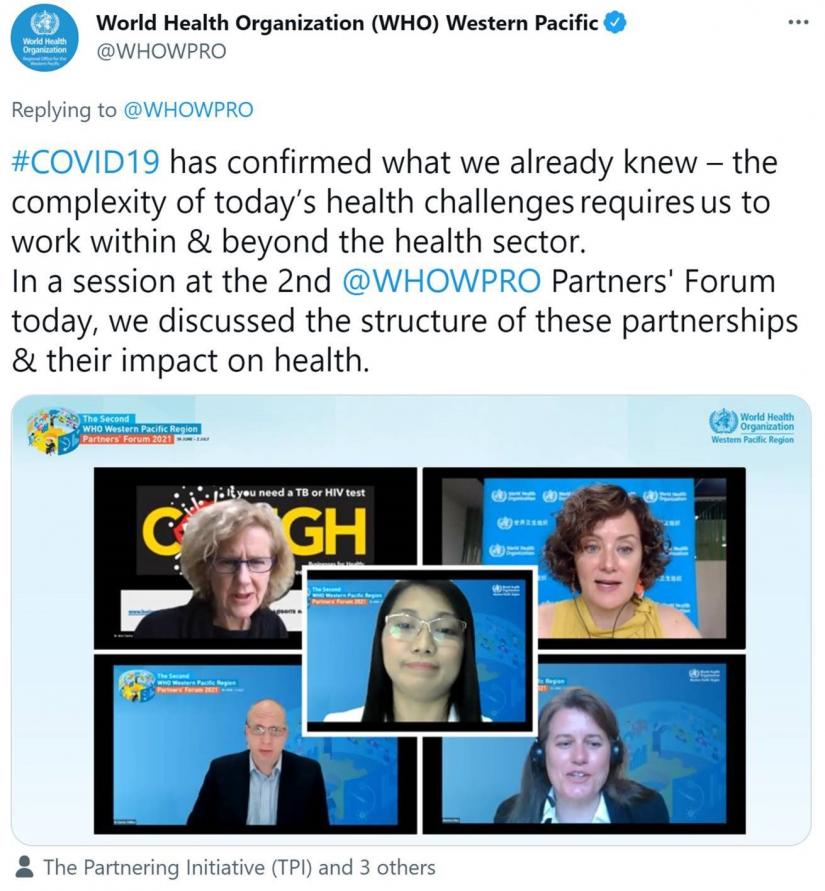
Second WHO Western Pacific Region Partners’ Forum 2021 was held from 30th June to 2nd July 2021. Over 30 countries were represented, and more than 700 participants joined the forum over the three-day period. WHO Regional Director for the Western Pacific, Dr Takeshi Kasai, gave the opening remarks.
The forum consisted of multiple interactive sessions highlighting critical public health challenges in the Western Pacific region. The forum used a highly interactive virtual platform that enabled participants to connect and collaborate with partners in many different ways, such as ‘speed partnering’ sessions, chats and video calls with the partners, and appointments with WHO technical advisors.
As part of the forum, a panel of experts discussed ‘The Health Beyond the Health Sector: Innovative Partnerships for Public Health’, focusing on the benefits and challenges of partnerships. It was highlighted that the COVID-19 pandemic had intensified the pressure on health care systems globally but more so in the Western Pacific region. Consequently, partnerships are now more important to WHO’s work in the region than ever before.
Dr Darian Stibbe of The Partnering Initiative discussed challenges when bringing together different organisations such as businesses, agencies, government and non-government organisations (NGOs). He discussed the complexities of effective collaboration to maximise resource value. Dr Stibbe, explained three key concepts: leverage and exchange, combine and integrate, and system transformation. The concepts are foundational for partnerships. They utilise the resources to deliver organisational vision, provide a collaborative advantage for creating solutions and use multi-factorial levers to transform a system.
Loida Almendares of Families Choices discussed the outreach resources provided to small remote mining communities and their families in the Philippines, who have limited access to health resources. Many lived in confined spaces with little ventilation and masks. By raising awareness of how the miners could protect themselves during the Covid-19 pandemic, the miners were empowered to self-advocate, monitor for symptoms and actively participate in monitoring their health. The outreach service was a grassroots approach and was scaled up to a more sustainable means.

Gemma May of Royal National Lifeboat Institution (RNLI) discussed drowning prevention and the organisation’s unified approach with the United Nations. Approximately 2.5 million people have died over the last decade due to drowning, negatively impacting communities and families. Through leverage and communication via a multi-sector government collective, the RNLI identified opportunities to generate awareness and policy while emphasizing that drowning is preventable. The RNLI shared their knowledge and expertise to empower communities, increasing their resilience to climate change and reducing disaster risk.
Dr Ann Clarke of Business for Health Papua New Guinea (PNG) discussed the challenges in managing Tuberculosis (TB) infections, which remains a major contributing factor to deaths in PNG. A successful health promotion campaign called ‘Cover Your Cough’ raised national awareness and helped reduce TB transmission among private-sector workers in PNG.
There were many other informative and interactive sessions featuring public health priorities in the region, including non-communicable diseases and ageing and antimicrobial resistance.
Overall, all participants agreed that partnerships could provide financial support and influence policy, being critical levers for transformational change to become part of the solution.
For a detailed agenda for the forum, please click here.

